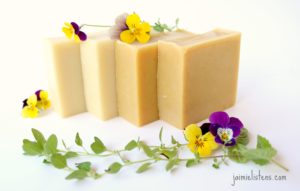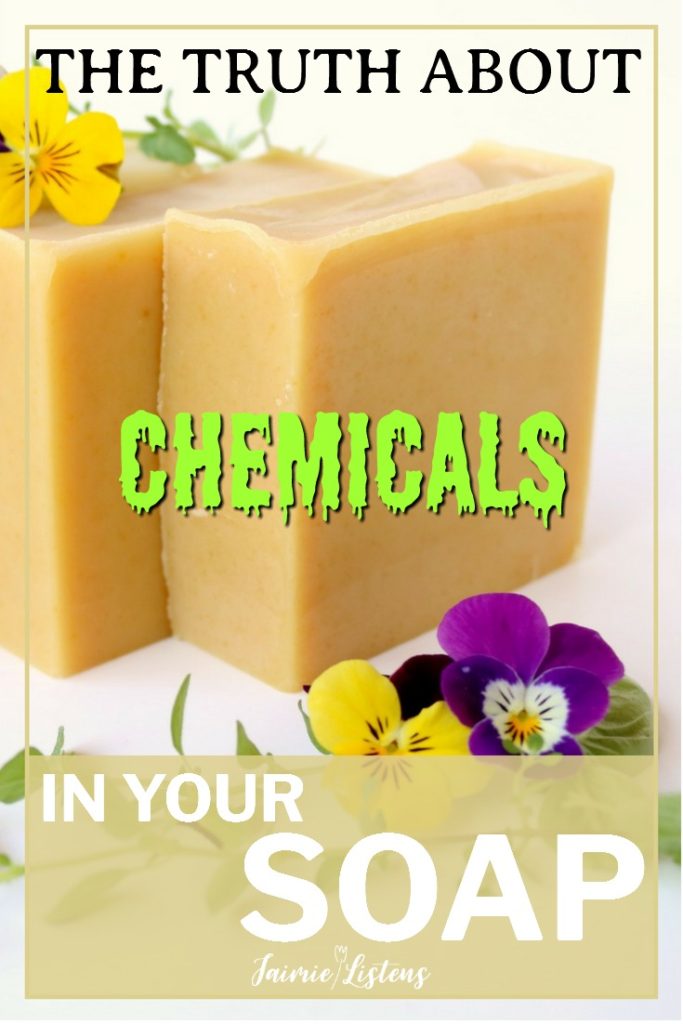Have you ever wondered if there are harmful chemicals in your soap? Nobody wants to bathe in chemicals, but are we being told the truth?

Most of us have heard that chemicals are horrible for us, and the media has done a great job causing us to sweat bullets about absolutely anything if it choke-holds our attention and gets ratings. You know how it goes, right? “Eggs are good. Wait! Eggs are bad! Wait, only if the chicken crossed the road on Friday!” It’s informational whiplash!
And even if you really don’t worry about it that much, you always have that ONE person in your life that helps you to worry about it. Wouldn’t it be great to help them worry less?
I get asked the chemical question a lot, since I happen to make soap. It’s like everyone is on red-alert about chemicals. Yes, we do need to worry about chemicals, but not the way most people have been trained to worry about them.
So, let’s see if we can break everything down and understand it better!
The key to understanding chemicals, is understanding what they are and the true CONTEXT surrounding how they are used.
To be perfectly frank, chemicals are ALWAYS used in soap making. Every single soap maker uses chemicals.
For example, lye (sodium hydroxide) is a very harsh chemical in its pure form and very, very dangerous if used incorrectly. Many people ask if they can have a lye-free soap, or want to know how to make soap without it. After all, it is used to open drains by dissolving the gunk and debris stuck in the drain pipe! Sounds scary, right?
But, did you know that food manufacturers use it to make pretzels? Did you know that the chemical reaction that occurs when making soap means that there is no longer any lye in the soap when you use it? Did you know it can be an organic chemical naturally found in nature?
So, if I told you that lye is organic, natural and edible would you believe me? I technically would be telling you the truth, but there is a problem. It is all about context. You have to understand what lye is and its proper use, before you can make the assumption that it is something to be avoided at all costs.
Well, what is lye then?
Lye is an alkali that our ancestors extracted from wood ashes left over from their cooking fires.
So, in reality, lye is totally organic and natural. Our ancestors would steep the wood ashes in a pail of water, evaporate it down to a certain concentration and this lye water could be used to make soap when they added it to vegetable oils and/or animal fats.
When the lye solution is combined with the oils and fats, a chemical reaction occurs. The lye and oils chemically change and transform into soap and glycerin, leaving no lye in the finished product. (Unless you get the measurements wrong!) Today lye is manufactured in a controlled, clean environment for better purity, safety and cleanliness.
When you use a bar of soap, you are not putting lye on your skin. So, to answer the question posed earlier, you cannot have soap without lye.
If you don’t have it, you will be bathing in oil, which can be very, very dangerous as well. Olive oil can KILL YOU (How about that for a new headline, eh?), if you use it in your tub and happen to slip and fall. Olive oil can BURN YOUR HOUSE DOWN if you use it in an oil lamp and it gets knocked over.
Ah, isn’t fear-mongering fun?
For pretzels, the concentration is so low when the lye is mixed with water, that it is completely safe to eat after it gets baked in the oven. It is the lye that helps give the pretzel its distinct flavor and dark brown crust. Some bakers choose to use baking soda, another alkali, instead. It’s all about how you use it. Of course you could “twist” the truth (yes puns are fun) by saing “Pretzel Company XYZ puts a chemical cleaner in their pretzels!”
Lye is dangerous, but not because it is bad. It can be very dangerous in high concentrations and with improper use. High-end cars are typically safe, until somebody gets run over by one, right?!?
The same can be said about essential oils.
Going “organic” isn’t the same thing as chemical free.
Essential oils are organic (plant-derived) chemicals. They have been produced by plants and used by humans for thousands of years. They can be dangerous when used improperly as well. Just because nature made the chemical, doesn’t make it safe to use any way a person sees fit.
You can get a chemical burn from essential oils just as you can get a chemical burn from lye – if used improperly. That is why it is so important to educate yourself on the correct use of any item used in a cosmetic, applied to the skin, or ingested.
As you can see, chemicals are used to make soap. It’s a good thing. Embrace it! And, don’t just take my word for it! I encourage you to come to your own educated decision by getting the proper facts in context!
If you are using lye to make soap take note!
Some soap makers suggest putting vinegar on a lye burn to “deactivate it.” Would you do that? THINK about it. What happens when you add an acid to a base… that’s right! Boom! A nice fizzy volcano. I prefer rinsing well with cold water and applying an oil such as coconut or olive oil onto the skin. Oil is what I use when an essential oil is burning my skin, because it slows down the absorption of that essential oil by diluting it. Why not put oil on your lye burn to give it something else to saponify (turn into soap) other than the fat in your cells? (This is just how my brain thinks about it, so please do call poison control for further instructions if you do have a burn. They can give you the best instructions for your situation.)
Now, there you have it! Your soap was made with chemicals and you are free to be excited about it!

Disclaimer: Jaimie is not the great and powerful Wizard of Oz, a lawyer, a doctor, a veterinarian, or a CPA. Nothing your read in my blog is a substitute for professional advice and doing your own good research. Remember that just because someone has credentials doesn’t guarantee their advice is golden or perfect. Put your smart hat on and do your due diligence. Good luck!

Leave a Reply